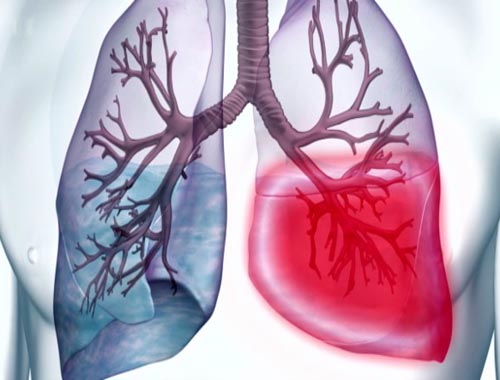Pneumonia

Published: 18 Jun 2025
ICD9: 486.00 ICD10: J17 ICD11: CA40
Pneumonia is an infection that inflames the air sacs in one or both lungs.
The air sacs may fill with fluid or pus (purulent material), causing cough with phlegm or pus, fever, chills, and difficulty breathing.
Here's a breakdown of key aspects:
![]() What it affects: The air sacs in the lungs (alveoli).
What it affects: The air sacs in the lungs (alveoli).
![]() What happens: The alveoli become inflamed and filled with fluid or pus.
What happens: The alveoli become inflamed and filled with fluid or pus.
![]() Common symptoms:
Common symptoms:![]()

![]() Cough (often with phlegm or pus)
Cough (often with phlegm or pus)![]()

![]() Fever
Fever![]()

![]() Chills
Chills![]()

![]() Shortness of breath or difficulty breathing
Shortness of breath or difficulty breathing![]()

![]() Chest pain when you breathe or cough
Chest pain when you breathe or cough
![]() Causes: Pneumonia can be caused by a variety of infectious agents, including:
Causes: Pneumonia can be caused by a variety of infectious agents, including:![]()

![]() Bacteria: The most common cause of pneumonia in adults. *Streptococcus pneumoniae* is a frequent culprit.
Bacteria: The most common cause of pneumonia in adults. *Streptococcus pneumoniae* is a frequent culprit.![]()

![]() Viruses: Common viral causes include influenza (flu), respiratory syncytial virus (RSV), and the common cold viruses. Viral pneumonia is often milder than bacterial pneumonia.
Viruses: Common viral causes include influenza (flu), respiratory syncytial virus (RSV), and the common cold viruses. Viral pneumonia is often milder than bacterial pneumonia.![]()

![]() Fungi: Less common, but can occur in people with weakened immune systems or chronic health conditions.
Fungi: Less common, but can occur in people with weakened immune systems or chronic health conditions.![]()

![]() Mycoplasma: A type of bacteria-like organism that can cause "walking pneumonia" (a milder form).
Mycoplasma: A type of bacteria-like organism that can cause "walking pneumonia" (a milder form).
![]() Types of Pneumonia:
Types of Pneumonia:![]()

![]() Community-acquired pneumonia (CAP): Pneumonia that develops in people who haven't been recently hospitalized.
Community-acquired pneumonia (CAP): Pneumonia that develops in people who haven't been recently hospitalized.![]()

![]() Hospital-acquired pneumonia (HAP): Pneumonia that develops in people during or after a stay in a hospital. It tends to be more serious because the bacteria involved may be more resistant to antibiotics.
Hospital-acquired pneumonia (HAP): Pneumonia that develops in people during or after a stay in a hospital. It tends to be more serious because the bacteria involved may be more resistant to antibiotics.![]()

![]() Aspiration pneumonia: Pneumonia that occurs when food, saliva, liquids, or vomit is inhaled into the lungs.
Aspiration pneumonia: Pneumonia that occurs when food, saliva, liquids, or vomit is inhaled into the lungs.![]()

![]() Walking Pneumonia: A milder form of pneumonia that may not require bed rest.
Walking Pneumonia: A milder form of pneumonia that may not require bed rest.
![]() Risk Factors:
Risk Factors:![]()

![]() Age (infants and older adults are more vulnerable)
Age (infants and older adults are more vulnerable)![]()

![]() Weakened immune system (due to conditions like HIV/AIDS, cancer treatment, or organ transplant)
Weakened immune system (due to conditions like HIV/AIDS, cancer treatment, or organ transplant)![]()

![]() Chronic diseases (such as asthma, COPD, heart disease, or diabetes)
Chronic diseases (such as asthma, COPD, heart disease, or diabetes)![]()

![]() Smoking
Smoking![]()

![]() Difficulty swallowing (due to stroke, Parkinson's disease, or other neurological conditions)
Difficulty swallowing (due to stroke, Parkinson's disease, or other neurological conditions)
![]() Diagnosis: Usually involves a physical exam, chest X-ray, and sometimes blood tests or sputum tests.
Diagnosis: Usually involves a physical exam, chest X-ray, and sometimes blood tests or sputum tests.
![]() Treatment: Depends on the type and severity of pneumonia.
Treatment: Depends on the type and severity of pneumonia.![]()

![]() Antibiotics: For bacterial pneumonia.
Antibiotics: For bacterial pneumonia.![]()

![]() Antiviral medications: For viral pneumonia (sometimes).
Antiviral medications: For viral pneumonia (sometimes).![]()

![]() Antifungal medications: For fungal pneumonia.
Antifungal medications: For fungal pneumonia.![]()

![]() Supportive care: Rest, fluids, and pain relievers. Severe cases may require hospitalization and oxygen therapy.
Supportive care: Rest, fluids, and pain relievers. Severe cases may require hospitalization and oxygen therapy.
![]() Prevention:
Prevention:![]()

![]() Vaccines: Pneumococcal vaccines (for *Streptococcus pneumoniae*) and annual flu vaccines can help prevent some types of pneumonia.
Vaccines: Pneumococcal vaccines (for *Streptococcus pneumoniae*) and annual flu vaccines can help prevent some types of pneumonia.![]()

![]() Good hygiene: Frequent handwashing.
Good hygiene: Frequent handwashing.![]()

![]() Avoiding smoking.
Avoiding smoking.![]()

![]() Managing underlying health conditions.
Managing underlying health conditions.
Important Note: Pneumonia can be a serious illness, and you should see a doctor if you think you have symptoms. Prompt diagnosis and treatment are crucial to prevent complications.